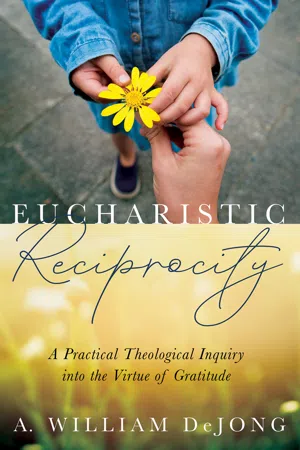![]()
CHAPTER 1
INTRODUCTION
On September 17, 2011, a protest movement was launched by a Canadian magazine that attracted followers from across North America and garnered widespread media attention. Dubbed “Occupy Wall Street,” this movement was occasioned by resistance to social and economic inequality and opposition to greed, corruption, and the unfair influence of the financial sector in government affairs. Whatever assessment one has of the movement, one fact is indisputable—greed is widespread and increasing. Apparent among those with both high and modest incomes, greed is evident in Canada especially in terms of growing household debt, i.e., people spending more than they earn.
Simultaneous with rampant overspending in Canadian culture is the widespread embrace of gratitude as something virtuous. Though there have always existed cultures, both ancient and non-Western, in which expressions of gratitude are deemed unnecessary or unwelcome, the absence of gratitude seems intolerable, if not immoral, for Canadians. From the moment they can speak, children are taught to say, “thank you.” It is easy to say, offends no one, and can be used even to discourage certain behaviors in advance (as in, “Thank you for not smoking.”). Gratitude is regarded as a necessary expression of appreciation for a gift received, “one of the building blocks of a civil and humane society.” Thanksgiving Day, in Canada and the United States, remains a popular civic holiday and the occasion when many happily take inventory of what they have and enumerate the items for which, and the people for whom, they are grateful.
Many will argue that saying “thank you” for many Westerners is merely reflexive and instinctive, the product of an etiquette indelibly etched into one’s subconscious by parents and teachers and thus often spoken thoughtlessly. To conclude that reflexive and instinctive behaviors are meaningless is reductionistic, however, and fails to acknowledge the power embedded in the ordinary. Cultural anthropologists increasingly recognize that common rituals do not merely represent power; they are powerful. To forego an expected ritual is to slight it, thereby threatening social equilibrium and provoking angst, if not anger.
It is the simultaneity of a widespread cultural problem with greed and an equally widespread cultural esteem of gratitude that first occasioned my interest in gratitude. Is there perhaps something in our understanding of gratitude that still leaves us vulnerable to greed? In what follows, therefore, I launch a theological inquiry to probe the nature of gratitude as a virtue. The moral saboteurs of gratitude are considered in chapter 2, and its philosophical detractors are addressed in chapter 3. Chapter 4 offers a theological profile of gratitude which amounts to a modest apologia for gratitude as a virtue in response to the issues raised in chapter 3, and chapter 5 recommends practices to reduce the sabotage identified in chapter 2. Because there is, so far as I know, no book-length treatment of the theology of gratitude this venture has a particularly vulnerable character.
Research Question
The subject of gratitude is especially fascinating to me as a pastor in a confessionally Reformed church because gratitude is situated at the very heart of the Reformed construal of the Christian life. The Heidelberg Catechism (1563), widely embraced as a doctrinal standard in confessional Reformed churches, views the Christian life under the rubric of the Ten Commandments, but treats the Ten Commandments themselves under the motif of gratitude. “In this frame of reference,” Stob writes, “morality loses all its hardness and harshness. Duties are no longer onerous.” The law is “contemplated as a gracious prescription supplying a happy and thankful man with helpful directives concerning how to satisfy someone whom it is his deepest desire to please.”
Stob’s favorable perspective notwithstanding, literature produced by Reformed ethicists tends to focus on moral quandaries, dilemmas, and pressing contemporary ethical issues. The insights generated by this approach are certainly instructive for assessing ethical problems and helpful in sharpening one’s conscience, though the underlying assumption seems to be that ethical problems are best resolved by clear thinking, i.e., knowing how to apply rightly biblical norms, principles, patterns, etc. Such literature, therefore, is not always particularly useful in ministry because the moral problems pastors encounter often fall beyond its scope. Most people do not lie awake at night grappling with the ethics of euthanasia, abortion, or military drones, etc. This is not to say that they always think clearly about these issues; it is to say that their lives are not unsettled by questions of their morality. On the other hand, many are racked with fear, shame, guilt, and powerlessness because of sinful urges and impulses which threaten and often subdue them. The ethical challenges most face, in other words, belong to a category I would designate as sins of desire rather than simply sins of thought. In many instances, in fact, the sin of desire is problematic to someone precisely because he or she is thinking clearly.
How should one respond pastorally to the problem of sinful desires? For some, it is to recall and then recite a Bible verse in which the sin is denounced under the assumption that a fresh conviction of the sin will drive the person to Christ for forgiveness and renewal. For others, it might be to recommend a book or pamphlet in which the particular sin is addressed. Many pastors feel unable to do little more than identify the sin (of which the person is often keenly aware), urge ...
